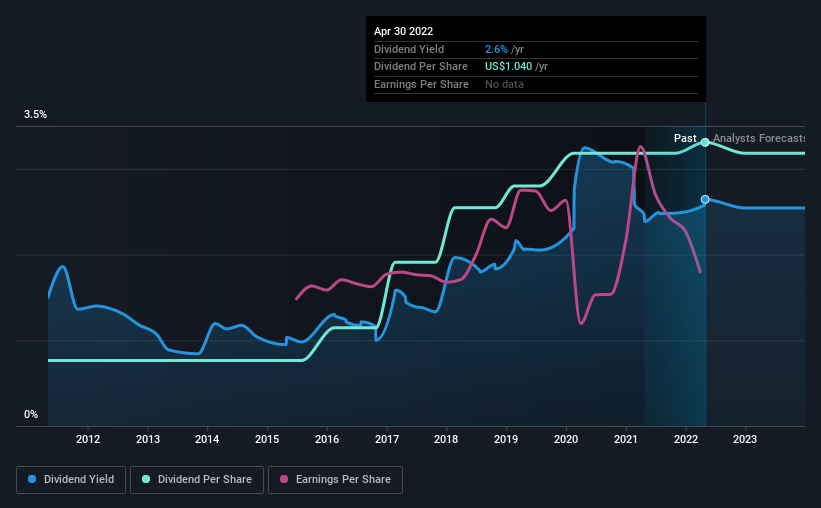- United States
- /
- Insurance
- /
- NYSE:EIG
Employers Holdings (NYSE:EIG) Has Announced That It Will Be Increasing Its Dividend To US$0.26

The board of Employers Holdings, Inc. (NYSE:EIG) has announced that it will be increasing its dividend on the 25th of May to US$0.26. The announced payment will take the dividend yield to 2.6%, which is in line with the average for the industry.
Check out our latest analysis for Employers Holdings
Employers Holdings' Earnings Easily Cover the Distributions
We like a dividend to be consistent over the long term, so checking whether it is sustainable is important. Based on the last payment, Employers Holdings was paying only paying out a fraction of earnings, but the payment was a massive 401% of cash flows. The business might be trying to strike a balance between returning cash to shareholders and reinvesting back into the business, but this high of a payout ratio could definitely force the dividend to be cut if the company runs into a bit of a tough spot.
Looking forward, earnings per share is forecast to fall by 27.5% over the next year. Assuming the dividend continues along recent trends, we believe the payout ratio could be 49%, which we are pretty comfortable with and we think is feasible on an earnings basis.

Employers Holdings Has A Solid Track Record
The company has a sustained record of paying dividends with very little fluctuation. Since 2012, the dividend has gone from US$0.24 to US$1.04. This implies that the company grew its distributions at a yearly rate of about 16% over that duration. It is good to see that there has been strong dividend growth, and that there haven't been any cuts for a long time.
Dividend Growth May Be Hard To Achieve
The company's investors will be pleased to have been receiving dividend income for some time. Unfortunately, Employers Holdings' earnings per share has been essentially flat over the past five years, which means the dividend may not be increased each year. While growth may be thin on the ground, Employers Holdings could always pay out a higher proportion of earnings to increase shareholder returns.
Our Thoughts On Employers Holdings' Dividend
Overall, this is probably not a great income stock, even though the dividend is being raised at the moment. While the low payout ratio is redeeming feature, this is offset by the minimal cash to cover the payments. Overall, we don't think this company has the makings of a good income stock.
Market movements attest to how highly valued a consistent dividend policy is compared to one which is more unpredictable. Meanwhile, despite the importance of dividend payments, they are not the only factors our readers should know when assessing a company. Case in point: We've spotted 3 warning signs for Employers Holdings (of which 1 is significant!) you should know about. If you are a dividend investor, you might also want to look at our curated list of high yield dividend stocks.
If you're looking to trade Employers Holdings, open an account with the lowest-cost platform trusted by professionals, Interactive Brokers.
With clients in over 200 countries and territories, and access to 160 markets, IBKR lets you trade stocks, options, futures, forex, bonds and funds from a single integrated account.
Enjoy no hidden fees, no account minimums, and FX conversion rates as low as 0.03%, far better than what most brokers offer.
Sponsored ContentValuation is complex, but we're here to simplify it.
Discover if Employers Holdings might be undervalued or overvalued with our detailed analysis, featuring fair value estimates, potential risks, dividends, insider trades, and its financial condition.
Access Free AnalysisHave feedback on this article? Concerned about the content? Get in touch with us directly. Alternatively, email editorial-team (at) simplywallst.com.
This article by Simply Wall St is general in nature. We provide commentary based on historical data and analyst forecasts only using an unbiased methodology and our articles are not intended to be financial advice. It does not constitute a recommendation to buy or sell any stock, and does not take account of your objectives, or your financial situation. We aim to bring you long-term focused analysis driven by fundamental data. Note that our analysis may not factor in the latest price-sensitive company announcements or qualitative material. Simply Wall St has no position in any stocks mentioned.
About NYSE:EIG
Employers Holdings
Through its subsidiaries, provides workers' compensation insurance and services in the United States.
Excellent balance sheet established dividend payer.
Similar Companies
Market Insights
Community Narratives



